Deck 19: The Cardiovascular System: the Blood
Question
Question
Question
Question
Question
Question
Question
Question
Question
Question
Question
Question
Question
Question
Question
Question
Question
Question
Question
Question
Question
Question
Question
Question
Question
Question
Question
Question
Question
Question
Question
Question
Question
Question
Question
Question
Question
Question
Question
Question
Question
Question
Question
Question
Question
Question
Question
Question
Question
Question
Question
Question
Question
Question
Question
Question
Question
Question
Question
Question
Question
Question
Question
Question
Question
Question
Question
Question
Question
Question
Question
Question
Question
Question

Unlock Deck
Sign up to unlock the cards in this deck!
Unlock Deck
Unlock Deck
1/74
Play
Full screen (f)
Deck 19: The Cardiovascular System: the Blood
1
Which of the following blood cells is a phagocyte?
A)Neutrophil
B)Platelet
C)Lymphocyte
D)Basophil
E)Erythrocyte
A)Neutrophil
B)Platelet
C)Lymphocyte
D)Basophil
E)Erythrocyte
A
2
The hematocrit is a measure of the percentage of whole blood occupied by
A)WBCs.
B)platelets.
C)RBCs.
D)plasma.
E)plasma proteins.
A)WBCs.
B)platelets.
C)RBCs.
D)plasma.
E)plasma proteins.
C
3
Which of the following blood cells is involved in reducing blood loss from a damaged blood vessel?
A)Erythrocyte
B)Platelet
C)Lymphocyte
D)Basophil
E)Neutrophil
A)Erythrocyte
B)Platelet
C)Lymphocyte
D)Basophil
E)Neutrophil
B
4
The major function of red blood cells is
A)nutrient transport.
B)cytokine stimulation.
C)blood cell proliferation.
D)gas transport.
E)disease resistance.
A)nutrient transport.
B)cytokine stimulation.
C)blood cell proliferation.
D)gas transport.
E)disease resistance.

Unlock Deck
Unlock for access to all 74 flashcards in this deck.
Unlock Deck
k this deck
5
A megakaryoblast will develop into
A)a red blood cell.
B)a white blood cell.
C)a platelet.
D)either a white blood cell or a platelet.
E)none of these choices.
A)a red blood cell.
B)a white blood cell.
C)a platelet.
D)either a white blood cell or a platelet.
E)none of these choices.

Unlock Deck
Unlock for access to all 74 flashcards in this deck.
Unlock Deck
k this deck
6
What percentage of blood plasma is water?
A)95.1%
B)91.5%
C)88.5%
D)4)9%
E)8)5%
A)95.1%
B)91.5%
C)88.5%
D)4)9%
E)8)5%

Unlock Deck
Unlock for access to all 74 flashcards in this deck.
Unlock Deck
k this deck
7
Which of the following is NOT a true statement regarding blood?
A)The normal average temperature of blood is around 100.4o F.
B)The normal pH range for blood is 7.35-7.45.
C)Hemocytoblasts are a common component of circulating blood.
D)The primary circulating blood cell is the RBC.
E)Blood is a liquid connective tissue consisting of cells and a liquid extracellular matrix.
A)The normal average temperature of blood is around 100.4o F.
B)The normal pH range for blood is 7.35-7.45.
C)Hemocytoblasts are a common component of circulating blood.
D)The primary circulating blood cell is the RBC.
E)Blood is a liquid connective tissue consisting of cells and a liquid extracellular matrix.

Unlock Deck
Unlock for access to all 74 flashcards in this deck.
Unlock Deck
k this deck
8
Approximately,how many hemoglobin molecules are found in each RBC?
A)50 million
B)100 million
C)280 million
D)320 million
E)430 million
A)50 million
B)100 million
C)280 million
D)320 million
E)430 million

Unlock Deck
Unlock for access to all 74 flashcards in this deck.
Unlock Deck
k this deck
9
Which of the following plasma proteins plays a role in blood clotting?
A)Albumin
B)Globulins
C)Fibrinogen
D)Prostaglandins
E)None of these choices
A)Albumin
B)Globulins
C)Fibrinogen
D)Prostaglandins
E)None of these choices

Unlock Deck
Unlock for access to all 74 flashcards in this deck.
Unlock Deck
k this deck
10
Which of the following cells is NOT an agranular leukocyte?
A)Monocytes
B)Macrophage
C)Lymphocyte
D)Basophil
E)All of these choices
A)Monocytes
B)Macrophage
C)Lymphocyte
D)Basophil
E)All of these choices

Unlock Deck
Unlock for access to all 74 flashcards in this deck.
Unlock Deck
k this deck
11
Which of the following is NOT a major function of the blood?
A)Transportation of nutrients
B)Regulation of blood pH
C)Protection against infectious disease
D)Transportation of heat
E)Production of oxygen
A)Transportation of nutrients
B)Regulation of blood pH
C)Protection against infectious disease
D)Transportation of heat
E)Production of oxygen

Unlock Deck
Unlock for access to all 74 flashcards in this deck.
Unlock Deck
k this deck
12
Ferritin is a protein used to
A)transport iron in the blood.
B)store iron in the liver.
C)oxidize iron in the peroxisomes.
D)synthesize iron.
E)absorb iron across intestinal cells.
A)transport iron in the blood.
B)store iron in the liver.
C)oxidize iron in the peroxisomes.
D)synthesize iron.
E)absorb iron across intestinal cells.

Unlock Deck
Unlock for access to all 74 flashcards in this deck.
Unlock Deck
k this deck
13
During hemopoiesis,some of the myeloid stem cells will eventually develop into
A)proerythroblasts.
B)T lymphoblasts.
C)B lymphoblasts.
D)NK lymphoblasts.
E)all of these choices.
A)proerythroblasts.
B)T lymphoblasts.
C)B lymphoblasts.
D)NK lymphoblasts.
E)all of these choices.

Unlock Deck
Unlock for access to all 74 flashcards in this deck.
Unlock Deck
k this deck
14
Which of the following blood cells release granules that intensify the inflammatory response and promote hypersensitivity (allergic)reactions?
A)Eosinophil
B)Monocyte
C)Lymphocyte
D)Basophil
E)Neutrophil
A)Eosinophil
B)Monocyte
C)Lymphocyte
D)Basophil
E)Neutrophil

Unlock Deck
Unlock for access to all 74 flashcards in this deck.
Unlock Deck
k this deck
15
Which of the following blood cells are the main soldiers in the immune system defense of the body against microbial invaders?
A)Eosinophil
B)Macrophage
C)Lymphocyte
D)Basophil
E)Platelet
A)Eosinophil
B)Macrophage
C)Lymphocyte
D)Basophil
E)Platelet

Unlock Deck
Unlock for access to all 74 flashcards in this deck.
Unlock Deck
k this deck
16
The process by which the formed elements of the blood develop is called
A)hematospermia.
B)hemopoiesis.
C)thrombocytosis.
D)hemostasis.
E)polycythemia.
A)hematospermia.
B)hemopoiesis.
C)thrombocytosis.
D)hemostasis.
E)polycythemia.

Unlock Deck
Unlock for access to all 74 flashcards in this deck.
Unlock Deck
k this deck
17
Towards the end of erythropoiesis in the bone marrow,a red blood cell loses its nucleus and becomes a
A)proerythroblast.
B)megakaryocyte.
C)progenitor cell.
D)mature erythrocyte.
E)reticulocyte.
A)proerythroblast.
B)megakaryocyte.
C)progenitor cell.
D)mature erythrocyte.
E)reticulocyte.

Unlock Deck
Unlock for access to all 74 flashcards in this deck.
Unlock Deck
k this deck
18
Which of the following hormones stimulates proliferation of red blood cells in red bone marrow?
A)erythropoietin (EPO)
B)thrombopoietin (TPO)
C)human growth hormone (hGH)
D)calcitonin (CT)
E)follicle-stimulating hormone (FSH)
A)erythropoietin (EPO)
B)thrombopoietin (TPO)
C)human growth hormone (hGH)
D)calcitonin (CT)
E)follicle-stimulating hormone (FSH)

Unlock Deck
Unlock for access to all 74 flashcards in this deck.
Unlock Deck
k this deck
19
Which of the following blood cells phagocytizes antigen-antibody complexes and are effective against parasitic worms?
A)Eosinophil
B)Monocyte
C)Lymphocyte
D)Basophil
E)Neutrophil
A)Eosinophil
B)Monocyte
C)Lymphocyte
D)Basophil
E)Neutrophil

Unlock Deck
Unlock for access to all 74 flashcards in this deck.
Unlock Deck
k this deck
20
Which of the following plasma proteins plays a role in disease resistance?
A)Albumin
B)Globulins
C)Fibrinogen
D)Myoglobin
E)Hemoglobin
A)Albumin
B)Globulins
C)Fibrinogen
D)Myoglobin
E)Hemoglobin

Unlock Deck
Unlock for access to all 74 flashcards in this deck.
Unlock Deck
k this deck
21
Which of the cells in the diagram will eventually develop into macrophages?

A)A
B)B
C)C
D)D
E)E

A)A
B)B
C)C
D)D
E)E

Unlock Deck
Unlock for access to all 74 flashcards in this deck.
Unlock Deck
k this deck
22
Which of following correctly lists the sequence of steps that occur during hemostasis in response to a damaged blood vessel?
A)vascular spasm,clotting,polycythemia
B)hemolysis,vascular spasm,platelet plug formation
C)emigration,clotting,hemolysis
D)vascular spasm,platelet plug formation,clotting
E)anemia,hemogenesis,platelet plug formation
A)vascular spasm,clotting,polycythemia
B)hemolysis,vascular spasm,platelet plug formation
C)emigration,clotting,hemolysis
D)vascular spasm,platelet plug formation,clotting
E)anemia,hemogenesis,platelet plug formation

Unlock Deck
Unlock for access to all 74 flashcards in this deck.
Unlock Deck
k this deck
23
What is this figure demonstrating?
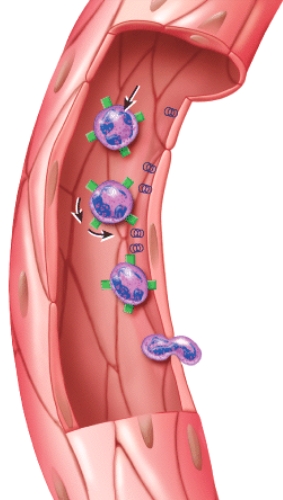
A)Erythropoiesis
B)RBC differentiation
C)Emigration
D)Clot formation
E)Clot retraction

A)Erythropoiesis
B)RBC differentiation
C)Emigration
D)Clot formation
E)Clot retraction

Unlock Deck
Unlock for access to all 74 flashcards in this deck.
Unlock Deck
k this deck
24
Which of the following situations could result in maternal antibodies attacking fetal blood cells during a second pregnancy?
A)Mom is Rh negative and fetus is Rh negative
B)Mom is Rh negative and fetus is Rh positive
C)Mom is Rh positive and fetus is Rh negative
D)Mom is Rh positive and fetus is Rh positive.
A)Mom is Rh negative and fetus is Rh negative
B)Mom is Rh negative and fetus is Rh positive
C)Mom is Rh positive and fetus is Rh negative
D)Mom is Rh positive and fetus is Rh positive.

Unlock Deck
Unlock for access to all 74 flashcards in this deck.
Unlock Deck
k this deck
25
What blood type is a person if their plasma contains only anti-A agglutinin?
A)A
B)B
C)O
D)AB
E)Not enough information is provided to answer question.
A)A
B)B
C)O
D)AB
E)Not enough information is provided to answer question.

Unlock Deck
Unlock for access to all 74 flashcards in this deck.
Unlock Deck
k this deck
26
Which of the cells in the diagram will increase the number of nuclear lobes as they age?

A)A
B)B
C)C
D)D
E)E

A)A
B)B
C)C
D)D
E)E

Unlock Deck
Unlock for access to all 74 flashcards in this deck.
Unlock Deck
k this deck
27
Which of the following chemical substances are NOT commonly released by mast cells?
A)Heparin
B)Histamine
C)Nitric oxide
D)Proteases
E)All of these choices
A)Heparin
B)Histamine
C)Nitric oxide
D)Proteases
E)All of these choices

Unlock Deck
Unlock for access to all 74 flashcards in this deck.
Unlock Deck
k this deck
28
Which labeled cell in the diagram is a WBC?
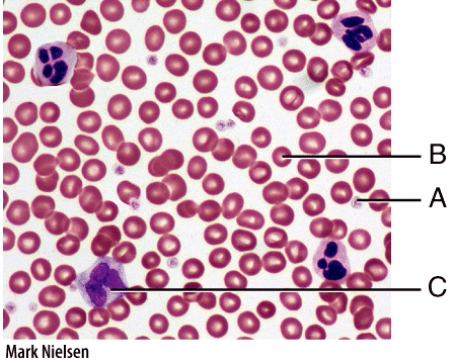
A)A
B)B
C)C
D)Both B and C
E)All of these choices

A)A
B)B
C)C
D)Both B and C
E)All of these choices

Unlock Deck
Unlock for access to all 74 flashcards in this deck.
Unlock Deck
k this deck
29
Which of the cells in the diagram can be subdivided into categories of small and large versions of this cell type?

A)A
B)B
C)C
D)D
E)E

A)A
B)B
C)C
D)D
E)E

Unlock Deck
Unlock for access to all 74 flashcards in this deck.
Unlock Deck
k this deck
30
Which letter in the diagram indicates the correct position of a myeloid stem cell?
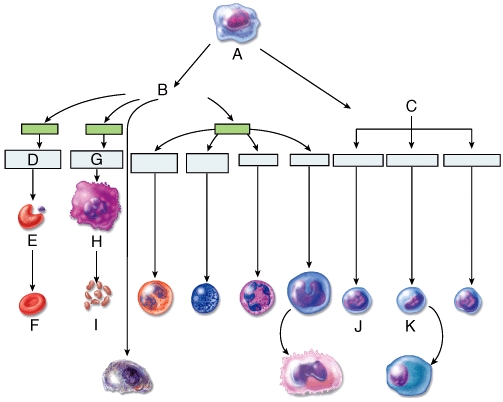
A)A
B)B
C)C
D)D
E)G

A)A
B)B
C)C
D)D
E)G

Unlock Deck
Unlock for access to all 74 flashcards in this deck.
Unlock Deck
k this deck
31
Which of the following antibodies would you find in the plasma of a person with type O blood?
A)anti-A
B)anti-B
C)anti-A and anti-B
D)No antibodies to ABO blood group antigens
E)Not enough information to answer
A)anti-A
B)anti-B
C)anti-A and anti-B
D)No antibodies to ABO blood group antigens
E)Not enough information to answer

Unlock Deck
Unlock for access to all 74 flashcards in this deck.
Unlock Deck
k this deck
32
Which of the following substances is an anticoagulant produced by mast cells and basophils?
A)Heparin
B)Fibrinogen
C)Thromboxane A2
D)Prostacyclin
E)Plasmin
A)Heparin
B)Fibrinogen
C)Thromboxane A2
D)Prostacyclin
E)Plasmin

Unlock Deck
Unlock for access to all 74 flashcards in this deck.
Unlock Deck
k this deck
33
What does this figure represent?
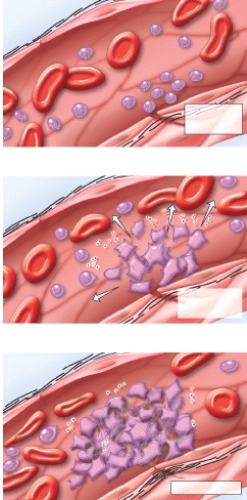
A)Erythropoiesis
B)RBC differentiation
C)Emigration
D)Clot formation
E)Clot retraction

A)Erythropoiesis
B)RBC differentiation
C)Emigration
D)Clot formation
E)Clot retraction

Unlock Deck
Unlock for access to all 74 flashcards in this deck.
Unlock Deck
k this deck
34
The intrinsic and extrinsic pathways of blood clotting are identical after formation of
A)thromboplastin.
B)prothrombinase.
C)clotting factor XII.
D)fibrin.
E)tissue factor.
A)thromboplastin.
B)prothrombinase.
C)clotting factor XII.
D)fibrin.
E)tissue factor.

Unlock Deck
Unlock for access to all 74 flashcards in this deck.
Unlock Deck
k this deck
35
Which of the following clotting factors is involved in strengthening and stabilizing a blood clot?
A)Factor V
B)Factor VII
C)Factor XI
D)Factor XIII
E)Factor XIV
A)Factor V
B)Factor VII
C)Factor XI
D)Factor XIII
E)Factor XIV

Unlock Deck
Unlock for access to all 74 flashcards in this deck.
Unlock Deck
k this deck
36
Which of the following opposes the action of thromboxane A2 by inhibiting platelet adhesion and release?
A)Heparin
B)Fibrinogen
C)Plasmin
D)Antithrombin
E)Prostacyclin
A)Heparin
B)Fibrinogen
C)Plasmin
D)Antithrombin
E)Prostacyclin

Unlock Deck
Unlock for access to all 74 flashcards in this deck.
Unlock Deck
k this deck
37
Which labeled cell in the diagram will develop into thrombocytes?
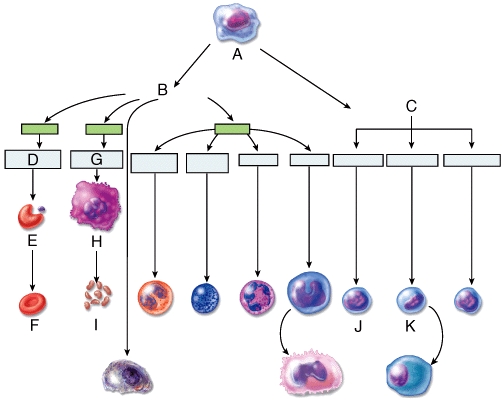
A)G
B)J
C)K
D)L
E)E

A)G
B)J
C)K
D)L
E)E

Unlock Deck
Unlock for access to all 74 flashcards in this deck.
Unlock Deck
k this deck
38
Which of the following hormones stimulates the development of megakaryoblasts?
A)Erythropoietin
B)Thrombopoietin
C)Nitric oxide
D)Human growth hormone
E)Heparin
A)Erythropoietin
B)Thrombopoietin
C)Nitric oxide
D)Human growth hormone
E)Heparin

Unlock Deck
Unlock for access to all 74 flashcards in this deck.
Unlock Deck
k this deck
39
The process of a white blood cell squeezing between endothelial cells to exit a blood vessel is called
A)emigration.
B)diaphysis.
C)adhesion.
D)opsonization.
E)phagocytosis.
A)emigration.
B)diaphysis.
C)adhesion.
D)opsonization.
E)phagocytosis.

Unlock Deck
Unlock for access to all 74 flashcards in this deck.
Unlock Deck
k this deck
40
Which labeled cell in the diagram is a pluripotent stem cell?
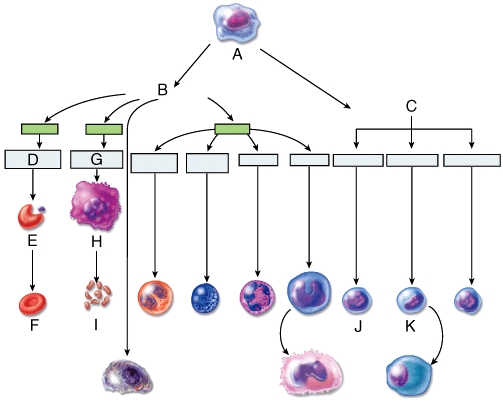
A)A
B)B
C)C
D)D
E)G

A)A
B)B
C)C
D)D
E)G

Unlock Deck
Unlock for access to all 74 flashcards in this deck.
Unlock Deck
k this deck
41
Which of the following blood cell types normally comprises the highest percentage of the blood component labeled II in the figure?
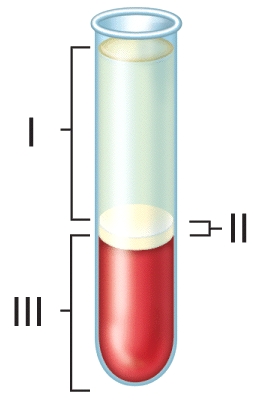
A)eosinophils
B)monocytes
C)lymphocytes
D)neutrophils
E)basophils

A)eosinophils
B)monocytes
C)lymphocytes
D)neutrophils
E)basophils

Unlock Deck
Unlock for access to all 74 flashcards in this deck.
Unlock Deck
k this deck
42
Which of the following precursor cells give rise to granular leukocytes?
A)Proerythroblast
B)Megakaryoblast
C)Lymphoblast
D)Myeloblast
E)None of the selections are correct.
A)Proerythroblast
B)Megakaryoblast
C)Lymphoblast
D)Myeloblast
E)None of the selections are correct.

Unlock Deck
Unlock for access to all 74 flashcards in this deck.
Unlock Deck
k this deck
43
A high count of which of the white blood cells shown in the figure may indicate viral infections?

A)A & B
B)B & C
C)C & D
D)D & E
E)E & C

A)A & B
B)B & C
C)C & D
D)D & E
E)E & C

Unlock Deck
Unlock for access to all 74 flashcards in this deck.
Unlock Deck
k this deck
44
List and briefly describe the major functions of blood.

Unlock Deck
Unlock for access to all 74 flashcards in this deck.
Unlock Deck
k this deck
45
When blood from a normal adult is centrifuged as shown in the figure,which of the following components occupies the greatest volume?
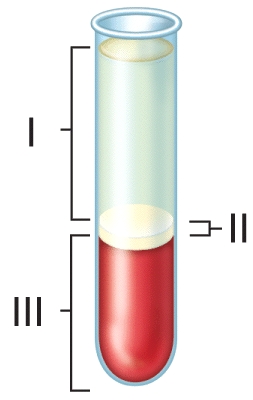
A)plasma
B)red blood cells
C)platelets
D)buffy coat
E)white blood cells

A)plasma
B)red blood cells
C)platelets
D)buffy coat
E)white blood cells

Unlock Deck
Unlock for access to all 74 flashcards in this deck.
Unlock Deck
k this deck
46
A high count of which of the white blood cells shown in the figure may indicate parasitic infection or autoimmune disease?

A)A
B)B
C)C
D)D
E)E

A)A
B)B
C)C
D)D
E)E

Unlock Deck
Unlock for access to all 74 flashcards in this deck.
Unlock Deck
k this deck
47
A high count of which of the white blood cells shown in the figure may indicate cancer or hypothyroidism?

A)A
B)B
C)C
D)D
E)E

A)A
B)B
C)C
D)D
E)E

Unlock Deck
Unlock for access to all 74 flashcards in this deck.
Unlock Deck
k this deck
48
A high count of which of the white blood cells shown in the figure may indicate fungal infection?

A)A
B)B
C)C
D)D
E)E

A)A
B)B
C)C
D)D
E)E

Unlock Deck
Unlock for access to all 74 flashcards in this deck.
Unlock Deck
k this deck
49
Explain the proposed role of hemoglobin in the regulation of blood flow and blood pressure.

Unlock Deck
Unlock for access to all 74 flashcards in this deck.
Unlock Deck
k this deck
50
Which of the following types of proteins is present at the lowest percentage of the blood component labeled I in the figure?
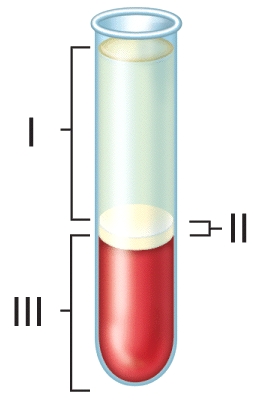
A)globulin
B)albumin
C)fibrinogen
D)all of the protein listed are found in equal percentages
E)none of proteins listed are found in component I

A)globulin
B)albumin
C)fibrinogen
D)all of the protein listed are found in equal percentages
E)none of proteins listed are found in component I

Unlock Deck
Unlock for access to all 74 flashcards in this deck.
Unlock Deck
k this deck
51
A high count of which of the white blood cells shown in the figure may indicate bacterial infection,stress,or inflammation?

A)A
B)B
C)C
D)D
E)E

A)A
B)B
C)C
D)D
E)E

Unlock Deck
Unlock for access to all 74 flashcards in this deck.
Unlock Deck
k this deck
52
Which of the following precursor cells eventually give rise to the platelets?
A)Megakaryoblast
B)Proerythroblast
C)T lymphoblast
D)Monoblast
E)Myeloblast
A)Megakaryoblast
B)Proerythroblast
C)T lymphoblast
D)Monoblast
E)Myeloblast

Unlock Deck
Unlock for access to all 74 flashcards in this deck.
Unlock Deck
k this deck
53
Which of the following formed elements found in the blood are derived from reticulocytes?
A)Platelets
B)Erythrocytes
C)T lymphocytes
D)Monocytes
E)Basophils
A)Platelets
B)Erythrocytes
C)T lymphocytes
D)Monocytes
E)Basophils

Unlock Deck
Unlock for access to all 74 flashcards in this deck.
Unlock Deck
k this deck
54
Which of the following blood cell types normally comprises the smallest percentage of the blood component labeled II in the figure?
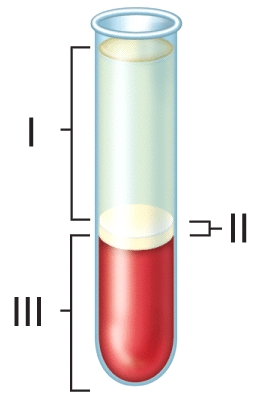
A)eosinophils
B)monocytes
C)lymphocytes
D)neutrophils
E)basophils

A)eosinophils
B)monocytes
C)lymphocytes
D)neutrophils
E)basophils

Unlock Deck
Unlock for access to all 74 flashcards in this deck.
Unlock Deck
k this deck
55
Which of the following precursor cells eventually give rise to neutrophils?
A)Megakaryoblast
B)Proerythroblast
C)T lymphoblast
D)Monoblast
E)Myeloblast
A)Megakaryoblast
B)Proerythroblast
C)T lymphoblast
D)Monoblast
E)Myeloblast

Unlock Deck
Unlock for access to all 74 flashcards in this deck.
Unlock Deck
k this deck
56
Why does damaged endothelium present an increased risk of blood clotting?

Unlock Deck
Unlock for access to all 74 flashcards in this deck.
Unlock Deck
k this deck
57
Which of the following types of proteins is present at the highest percentage in the blood component labeled I in the figure?
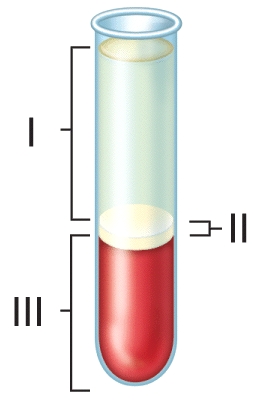
A)globulin
B)albumin
C)fibrinogen
D)thrombin
E)keratin

A)globulin
B)albumin
C)fibrinogen
D)thrombin
E)keratin

Unlock Deck
Unlock for access to all 74 flashcards in this deck.
Unlock Deck
k this deck
58
What is the normal concentration range of the formed element that comprises the blood component labeled III in the figure?
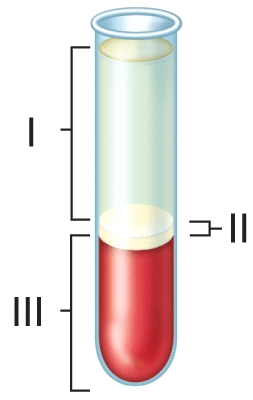
A)400,000-1 million cells/μL
B)150-200 cells/μL
C)4)8-5.4 million cells/μL
D)150,000-400,000 cells/μL
E)5,000-10,000 cells/μL

A)400,000-1 million cells/μL
B)150-200 cells/μL
C)4)8-5.4 million cells/μL
D)150,000-400,000 cells/μL
E)5,000-10,000 cells/μL

Unlock Deck
Unlock for access to all 74 flashcards in this deck.
Unlock Deck
k this deck
59
Which of the following precursor cells give rise to agranular leukocytes?
A)Proerythroblast
B)Megakaryoblast
C)Lymphoblast
D)Myeloblast
E)None of the selections are correct.
A)Proerythroblast
B)Megakaryoblast
C)Lymphoblast
D)Myeloblast
E)None of the selections are correct.

Unlock Deck
Unlock for access to all 74 flashcards in this deck.
Unlock Deck
k this deck
60
Describe the negative feedback loop that controls the rate of erythropoiesis.Under what circumstances would you expect the rate of erythropoiesis to increase? How would it be possible to tell if the rate of erythropoiesis is elevated?

Unlock Deck
Unlock for access to all 74 flashcards in this deck.
Unlock Deck
k this deck
61
List and briefly describe the three mechanisms used to reduce blood loss from a damaged blood vessel.

Unlock Deck
Unlock for access to all 74 flashcards in this deck.
Unlock Deck
k this deck
62
Anemia is defined as
A)a condition where blood does not clot properly.
B)a condition where blood cells are lysed by the immune response.
C)a condition where there is excessive bleeding.
D)a condition in which the oxygen-carrying capacity of blood is reduced.
E)none of these choices.
A)a condition where blood does not clot properly.
B)a condition where blood cells are lysed by the immune response.
C)a condition where there is excessive bleeding.
D)a condition in which the oxygen-carrying capacity of blood is reduced.
E)none of these choices.

Unlock Deck
Unlock for access to all 74 flashcards in this deck.
Unlock Deck
k this deck
63
Reduced vitamin B12 absorption from the small intestine due to reduced intrinsic factor production in the stomach results in condition called
A)hemorrhagic anemia.
B)aplastic anemia.
C)megaloblastic anemia.
D)pernicious anemia.
E)iron deficiency anemia.
A)hemorrhagic anemia.
B)aplastic anemia.
C)megaloblastic anemia.
D)pernicious anemia.
E)iron deficiency anemia.

Unlock Deck
Unlock for access to all 74 flashcards in this deck.
Unlock Deck
k this deck
64
Destruction of red bone marrow due to radiation results in
A)hemorrhagic anemia.
B)aplastic anemia.
C)megaloblastic anemia.
D)pernicious anemia.
E)iron deficiency anemia.
A)hemorrhagic anemia.
B)aplastic anemia.
C)megaloblastic anemia.
D)pernicious anemia.
E)iron deficiency anemia.

Unlock Deck
Unlock for access to all 74 flashcards in this deck.
Unlock Deck
k this deck
65
Which of the following formed elements in blood are removed by fixed macrophages in the spleen and liver after only 5 to 9 days in the circulation?
A)erythrocytes
B)thrombocytes
C)monocytes
D)basophils
E)eosinophils
A)erythrocytes
B)thrombocytes
C)monocytes
D)basophils
E)eosinophils

Unlock Deck
Unlock for access to all 74 flashcards in this deck.
Unlock Deck
k this deck
66
The average life span of an erythrocyte in the circulation is
A)4 to 5 years.
B)4 to 5 hours.
C)5 to 9 days.
D)120 days.
E)120 weeks.
A)4 to 5 years.
B)4 to 5 hours.
C)5 to 9 days.
D)120 days.
E)120 weeks.

Unlock Deck
Unlock for access to all 74 flashcards in this deck.
Unlock Deck
k this deck
67
Serum is
A)the same as plasma.
B)plasma without the clotting factors.
C)the same as lymph.
D)formed during the first step in blood clotting.
E)pulmonary interstitial fluid.
A)the same as plasma.
B)plasma without the clotting factors.
C)the same as lymph.
D)formed during the first step in blood clotting.
E)pulmonary interstitial fluid.

Unlock Deck
Unlock for access to all 74 flashcards in this deck.
Unlock Deck
k this deck
68
If type A blood is infused into a patient with type O blood,which of the following adverse reactions would you expect to observe in the patient?
A)Agglutination (clumping)of the transfused blood cells.
B)Complement-induced hemolysis of the transfused blood cells.
C)Released hemoglobin clogging the filtration membrane of the kidneys.
D)More than one of the answer selection is correct.
E)No adverse reactions would occur.
A)Agglutination (clumping)of the transfused blood cells.
B)Complement-induced hemolysis of the transfused blood cells.
C)Released hemoglobin clogging the filtration membrane of the kidneys.
D)More than one of the answer selection is correct.
E)No adverse reactions would occur.

Unlock Deck
Unlock for access to all 74 flashcards in this deck.
Unlock Deck
k this deck
69
A low count of which of the white blood cells shown in the figure may indicate radiation exposure,or systemic lupus erythromatosus?

A)A
B)B
C)C
D)D
E)E

A)A
B)B
C)C
D)D
E)E

Unlock Deck
Unlock for access to all 74 flashcards in this deck.
Unlock Deck
k this deck
70
A cord-blood transplant involves obtaining the stem cells to transplant into the diseased patient from
A)the spermatic cord of a donor's testes.
B)the spinal cord of the patient.
C)the umbilical cord of a donor shortly after birth.
D)the irradiated bone marrow of the patient.
E)the spinal cord of an aborted fetus.
A)the spermatic cord of a donor's testes.
B)the spinal cord of the patient.
C)the umbilical cord of a donor shortly after birth.
D)the irradiated bone marrow of the patient.
E)the spinal cord of an aborted fetus.

Unlock Deck
Unlock for access to all 74 flashcards in this deck.
Unlock Deck
k this deck
71
Which of the following blood types is a person whose blood cells were agglutinated by both anti-A serum and anti-B serum,but not by anti-Rh serum?
A)AB negative
B)AB positive
C)O negative
D)O positive
E)None of the selections are correct
A)AB negative
B)AB positive
C)O negative
D)O positive
E)None of the selections are correct

Unlock Deck
Unlock for access to all 74 flashcards in this deck.
Unlock Deck
k this deck
72
A condition in which inadequate intake of vitamin B12 or folic acid causes production of large abnormal red blood cells is called
A)hemorrhagic anemia.
B)aplastic anemia.
C)megaloblastic anemia.
D)pernicious anemia.
E)iron deficiency anemia.
A)hemorrhagic anemia.
B)aplastic anemia.
C)megaloblastic anemia.
D)pernicious anemia.
E)iron deficiency anemia.

Unlock Deck
Unlock for access to all 74 flashcards in this deck.
Unlock Deck
k this deck
73
Low counts of which two cell types shown in the figure may result from treatment with cortisol?

A)A & B
B)B & C
C)C & D
D)D & E
E)E & C

A)A & B
B)B & C
C)C & D
D)D & E
E)E & C

Unlock Deck
Unlock for access to all 74 flashcards in this deck.
Unlock Deck
k this deck
74
A low count of which of the white blood cells shown in the figure may indicate pregnancy,ovulation,or hyperthyroidism?

A)A
B)B
C)C
D)D
E)E

A)A
B)B
C)C
D)D
E)E

Unlock Deck
Unlock for access to all 74 flashcards in this deck.
Unlock Deck
k this deck


